Resilience Training for Entrepreneurs
🚀 Introduction: Entrepreneurship Is a Mental Marathon
Entrepreneurship looks glamorous on the outside — freedom, creativity, big dreams.
But behind the scenes, it’s often a grind of uncertainty, risk, and emotional chaos.
Sleep gets short. Anxiety runs high. Revenue fluctuates.
One week you’re invincible — the next, you’re googling “how to not burn out.”
That rollercoaster isn’t a character flaw. It’s biology.
Entrepreneurship constantly activates your stress-response system. The key is not avoiding stress but training your nervous system to recover quickly.
That’s what resilience training is all about — building the mental, physical, and emotional capacity to handle pressure without breaking.
🧠 Part 1: The Neuroscience of Entrepreneurial Stress

⚡ Why Entrepreneurs Live in Survival Mode
When you face uncertainty — like cash-flow dips, investor calls, or hiring fires — your amygdala (the brain’s alarm center) lights up.
It signals your adrenals to release cortisol and adrenaline, pushing you into fight-or-flight.
Short bursts of stress improve performance. But chronic activation hijacks your focus, sleep, and decision-making.
Over time, this leads to:
Emotional fatigue 😩
Short temper or anxiety ⚡
Poor impulse control 💸
Creative block or apathy 🧱
Sound familiar?
The entrepreneurial brain constantly toggles between visionary mode (dopamine, creativity) and panic mode (cortisol, fear).
Resilience is what lets you stay in visionary mode longer.
🧩 Resilience = Nervous System Regulation
Think of your nervous system like a thermostat.
Stress cranks the temperature up.
Resilience training teaches you to bring it back down quickly — not by suppressing stress, but by metabolizing it.
A resilient founder can pitch investors, handle criticism, or navigate layoffs without their nervous system staying stuck in red-alert.
🌿 Part 2: The Core Pillars of Entrepreneurial Resilience
Resilience isn’t one skill — it’s a system.
It involves balancing five interconnected areas:
1️⃣ Physiological resilience — how fast your body recovers from stress
2️⃣ Cognitive resilience — how quickly you refocus after setbacks
3️⃣ Emotional resilience — how well you regulate reactions
4️⃣ Social resilience — your support network
5️⃣ Purpose resilience — your sense of meaning when things collapse
Let’s train each one systematically.
🩺 Pillar 1: Physiological Resilience — Calming the Body
Entrepreneurs often forget their body is their hardware.
Without it, the “software” (mindset, strategy) lags or crashes.
🌬️ 1️⃣ Control Your Breath to Control Your Brain
Breath is the fastest lever to regulate the nervous system.
Try physiological sighs (endorsed by Dr. Andrew Huberman):
Inhale through the nose
Take a second small sip of air
Long, slow exhale through the mouth
Do 3–5 rounds when tension spikes.
Heart rate drops, cortisol lowers, and cognitive clarity returns.
☀️ 2️⃣ Get Morning Light and Movement
Morning sunlight resets circadian rhythm, improves cortisol balance, and boosts serotonin — all crucial for mood and energy regulation.
10–15 minutes of natural light within an hour of waking
Light physical activity (walk, mobility, or resistance bands)
This combo trains your body to wake naturally energized and sleep deeply, both vital for entrepreneurial focus.
🍵 3️⃣ Support with Key Supplements
The entrepreneurial lifestyle burns through nutrients fast.
Focus, stress tolerance, and recovery depend on replenishing what chronic stress depletes.
Top foundational supplements:
Magnesium glycinate or threonate — relaxes muscles and nerves
L-theanine — promotes calm alertness
Omega-3 fatty acids — support cognitive stability
Adaptogens (ashwagandha, rhodiola) — regulate cortisol
B-complex vitamins — rebuild energy metabolism
These aren’t performance enhancers; they’re resilience nutrients.
🧘 Pillar 2: Emotional Resilience — Staying Grounded Under Fire
Emotional reactivity kills clear decision-making.
The more emotionally reactive you are, the more you self-sabotage.
Training emotional resilience means staying responsive, not reactive.
💬 1️⃣ Label Your Emotions
Simply naming what you feel (“I’m anxious,” “I’m frustrated”) activates the prefrontal cortex, dampening amygdala activity.
This technique — called affect labeling — lowers physiological arousal.
It’s not woo-woo; it’s neuroscience.
🧘 2️⃣ Use Mindful Micro-Pauses
Before answering that heated Slack message or making a high-stakes call, pause.
One deep breath. One slow exhale.
That split second buys you emotional control and strategic clarity.
Make this reflex automatic.
🧩 3️⃣ Reframe Stress as a Challenge
Studies from Stanford show that viewing stress as a performance enhancer rather than a threat changes hormonal output.
When you reframe pressure as energy, cortisol becomes fuel, not poison.
Repeat:
“My body’s energy is preparing me for action.”
🧠 Pillar 3: Cognitive Resilience — Protecting Focus and Decision Quality
Entrepreneurs make hundreds of decisions daily.
Decision fatigue is real — and deadly to innovation.
🔄 1️⃣ Automate and Delegate
Every unnecessary choice drains prefrontal bandwidth.
Use systems:
Block time for deep work
Automate finances and communication
Delegate micro-decisions to your team
Simplifying frees up cognitive energy for strategy and creativity.
💻 2️⃣ Use “Cognitive Recovery”
Just as muscles need rest between sets, your brain needs mental deloads.
Try 90-minute work cycles → 10-minute breaks.
Walk, stretch, breathe — not scroll.
This supports dopamine recovery and prevents burnout.
🍃 3️⃣ Nootropics for Focus and Emotional Regulation
When used wisely, nootropics can sharpen cognition while stabilizing emotions.
Founder-friendly stack:
L-theanine + caffeine (morning) → calm focus
Rhodiola (midday) → stress resilience and stamina
Magnesium + glycine (evening) → nervous system reset
This maintains balanced neurochemistry across the founder’s day.
💬 Pillar 4: Social Resilience — Build a Support Network
Even the strongest founder collapses in isolation.
Loneliness magnifies stress and distorts judgment.
👥 1️⃣ Find Peer Support
Join small founder circles, mastermind groups, or local entrepreneur meetups.
Hearing others share their struggles reframes yours — and strengthens emotional endurance.
💬 2️⃣ Vulnerability Is a Leadership Skill
Sharing challenges with your team (in healthy doses) creates psychological safety.
It builds trust, alignment, and collective resilience.
Leaders who pretend to be superhuman usually end up silently burned out.
❤️ 3️⃣ Mentor Down, Learn Up
Mentoring newer founders grounds your perspective.
Being mentored by experienced ones accelerates wisdom.
Both reduce emotional isolation — the silent killer of entrepreneurial motivation.
🌍 Pillar 5: Purpose Resilience — The “Why” That Outlasts Burnout
When motivation dips, purpose becomes the fuel.
💡 1️⃣ Redefine Success Beyond Money
Financial milestones motivate, but they can’t carry you through chaos.
Lasting resilience comes from values-based goals — impact, creativity, freedom, contribution.
Ask:
“What problem would I still solve even if I’d already made it?”
That’s your anchor.
🪞 2️⃣ Write a “Founder’s Purpose Manifesto”
Summarize your mission, principles, and red lines.
Revisit it weekly.
Purpose clarity reduces emotional noise when tough decisions arise.
🧘 3️⃣ Practice Gratitude Under Pressure
Gratitude rewires your nervous system toward safety and abundance, countering cortisol’s scarcity mindset.
Each night, write 3 small wins — even “didn’t quit today.”
Consistency builds mental immunity against despair.
🧩 Part 3: Daily Resilience Training Framework

You can’t outsource resilience — but you can train it.
Here’s a simple 5-step daily blueprint:
| Time | Practice | Duration | Why It Works |
|---|---|---|---|
| 🌅 Morning | Breathwork + sunlight | 10 min | Sets circadian and stress balance |
| ☕ Mid-morning | Focus block + adaptogen stack | 90 min | Builds cognitive resilience |
| 🥗 Midday | Movement + hydration | 30 min | Lowers cortisol, boosts dopamine |
| 🌇 Evening | Reflective journaling | 10 min | Emotional processing |
| 🌙 Night | Magnesium + glycine + quiet | 30 min | Parasympathetic restoration |
Repeat daily. You’re rewiring your stress-recovery reflex.
⚙️ Part 4: The Founder’s Supplement Stack for Resilience
Supplements won’t replace self-care — but they can reinforce it.
🌿 1️⃣ Adaptogens for Stress Balance
Ashwagandha (300–600 mg) — lowers cortisol
Rhodiola (200–400 mg) — mental energy
Schisandra (300 mg) — stamina and liver support
💊 2️⃣ Nootropics for Cognitive Stability
L-Theanine (200 mg) — calm focus
Alpha-GPC (300 mg) — mental drive
Omega-3 (1–2 g EPA + DHA) — mood and decision quality
🌙 3️⃣ Sleep-Recovery Stack
Magnesium glycinate (300 mg)
Glycine (3 g)
Reishi mushroom (1 g)
⚖️ 4️⃣ Mood and Motivation Support
Saffron (15–30 mg) — serotonin modulation
B-Complex — neurotransmitter synthesis
N-acetyl cysteine (600 mg) — antioxidant defense
When combined with solid habits, these nutrients sustain clarity and composure.
🔬 Part 5: Mental Toughness Habits of Resilient Entrepreneurs
🧠 1️⃣ Emotional Separation from Outcomes
You can’t control the market — only your process.
Detaching your identity from wins and losses prevents emotional whiplash.
🔁 2️⃣ “Recovery Is a KPI” Mindset
Track recovery metrics (sleep, HRV, downtime) as seriously as revenue.
You can’t scale chaos.
🧭 3️⃣ Cognitive Reappraisal
When stress hits, ask:
“What’s the growth signal here?”
It shifts your brain from survival → strategy.
💬 4️⃣ Purpose Conversations
Schedule regular reflection with co-founders or mentors.
Clarity strengthens conviction.
🌈 Part 6: Building Organizational Resilience
A resilient founder creates a resilient company.
🤝 1️⃣ Model Calm Under Pressure
Teams don’t mirror what you say — they mirror your nervous system.
Your composure becomes cultural code.
🧩 2️⃣ Normalize Rest and Mental Health
Build “pause culture”: walking meetings, no-meeting Fridays, deep-work mornings.
Performance rises when recovery is normalized.
🧠 3️⃣ Teach Emotional Skills
Train teams in communication, feedback, and regulation.
Companies that invest in mental fitness outperform those that only optimize workflow.
🕊️ Part 7: The Long-Game of Founder Resilience
Resilience isn’t endurance.
It’s adaptability.
It’s knowing when to sprint — and when to recover.
It’s transforming stress into growth.
It’s refusing to let external chaos dictate inner peace.
Entrepreneurs who master this balance don’t just survive.
They build anti-fragile empires — systems that grow stronger from volatility.
Your product is important.
But your nervous system is your true startup.
📚 References
McEwen, B. “Stress, Adaptation, and the Brain.” Annual Review of Neuroscience, 2007.
Huberman, A. “Tools for Stress and Resilience.” Huberman Lab Podcast, 2023.
Tedeschi, R. & Calhoun, L. “Post-Traumatic Growth Theory.” Psychological Inquiry, 2004.
Panossian, A. “Adaptogens and Stress Regulation.” Phytomedicine, 2021.
Sarris, J. “Nutritional Psychiatry and Resilience.” World J. Psychiatry, 2019.
Walker, M. Why We Sleep. Scribner, 2017.
Duckworth, A. Grit: The Power of Passion and Perseverance. 2016.
Dweck, C. Mindset. Ballantine Books, 2006.
Related Posts
-

How to Measure Your Emotional Growth Over Time
Emotional growth can’t be measured on a scale — but it can be tracked through awareness, regulation, and reflection. Learn how to monitor your emotional evolution using journaling, biofeedback, and science-backed metrics for real progress. 💫
-

The Connection Between Creativity and Resilience
Creativity and resilience share the same roots — adaptability, flexibility, and imagination. Learn how creative expression rewires your brain for strength, helping you transform stress into growth through neuroscience, art, and self-reflection. 🌿
-

Why Cycling Supplements May Improve Long-Term Resilience
Your body adapts to everything — even supplements. Discover why cycling your supplements helps prevent tolerance, boost energy naturally, and build lasting resilience by aligning with your body’s biological rhythms. 🌿
-

The Role of Biofeedback in Emotional Strength
Learn how biofeedback bridges mind and body — helping you monitor heart rate, breath, and brain activity to build emotional strength, resilience, and calm under pressure. See how science meets mindfulness for lasting control. 🌿
-

How to Stay Strong During Long-Term Stress
Long-term stress doesn’t just drain your energy — it rewires your biology. Discover science-backed ways to strengthen your body, balance your mind, and build lasting resilience through breathwork, nutrition, mindset shifts, and supplements that restore calm and focus. 💪
-

How Nootropics Can Boost Emotional Control
Emotions don’t have to control you. Discover how nootropics like L-theanine, ashwagandha, saffron, and omega-3s help balance brain chemistry, improve focus, and strengthen your ability to stay calm and composed under stress. 🌿
-

Stacking Adaptogens for Maximum Resilience
Adaptogens are nature’s stress shield — helping you stay calm, energized, and clear even under pressure. Learn how to stack herbs like ashwagandha, rhodiola, reishi, and schisandra for maximum resilience, balance, and long-term vitality. 🌿
-
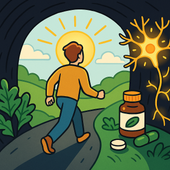
Post-Traumatic Growth and Supplements That Support It
After trauma, true healing means more than survival — it’s transformation. Learn how post-traumatic growth happens in the brain and body, and explore natural supplements like magnesium, ashwagandha, saffron, and omega-3s that support resilience, clarity, and emotional repair.
-

How to Regain Focus After Emotional Stress
After emotional stress, your nervous system feels frayed — your focus fades, thoughts race, and calm seems impossible. Learn how to restore balance, rebuild concentration, and retrain your brain for clarity and peace through evidence-based mind–body tools. 🌿
-

The Future of Sleep Supplements
The future of sleep supplements is here — where science meets nature. Discover how next-generation formulas use adaptogens, amino acids, and biotech innovations to support deep, restorative sleep without dependency. 🌙
-

Emerging Research on Sleep and Nootropics
Can nootropics help you sleep better? Discover how compounds like L-theanine, magnesium threonate, ashwagandha, and Alpha-GPC influence neurotransmitters, circadian rhythm, and brain recovery — bridging the gap between smarter days and deeper nights. 🌙
-

New Herbal Extracts for Deep Sleep
Discover the next generation of herbal extracts for deep sleep — from saffron and magnolia to jujube and lemon balm. Learn how these plant-based compounds calm the nervous system, balance cortisol, and promote truly restorative rest. 🌙
-
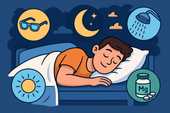
Sleep Biohacking: What Works and What Doesn’t
Biohacking your sleep can sound futuristic — from red light therapy to wearables and supplement stacks. But which hacks actually help, and which are just hype? Discover the science-backed sleep strategies that truly improve rest, recovery, and brain health. 🌙
-
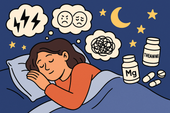
Sleep Support for People with Anxiety Disorders
💭 A restless mind can keep you up all night — thoughts spinning, heart racing, and peace feeling far away. Learn how to quiet overthinking, regulate your nervous system, and create a nightly ritual that teaches your brain to let go and rest deeply. 🌙
-
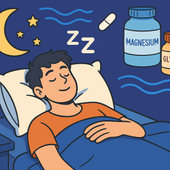
How to Fall Back Asleep After Waking Up
Waking up in the middle of the night? Learn how to fall back asleep quickly and calmly using breathing techniques, stress-reducing rituals, and natural supplements like magnesium and glycine. Restore your body’s rhythm and wake up feeling refreshed.
-

The Role of Omega-3s in Sleep Quality
-
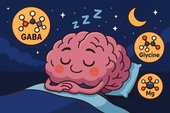
Stacking GABA and Glycine for Deeper Rest
Discover how stacking GABA and glycine can help you achieve deeper, more restorative sleep. Learn how these calming amino acids work together to relax your mind, soothe your body, and improve overall sleep quality—naturally and safely.
-

Overcoming Jet Lag with Supplements
✈️ Jet lag doesn’t have to ruin your trip! Discover how supplements like melatonin, magnesium, L-theanine, and tart cherry can help you reset your body clock faster, reduce fatigue, and recover energy naturally after long flights. 🌙
-

Managing Sleep During Times of Stress
Feeling wired and restless? Learn how to manage sleep during stressful times through nutrition, breathwork, and natural supplements like magnesium and L-theanine. Discover how to calm your nervous system and restore deep, peaceful rest—even when life feels overwhelming.
-

The Role of Magnesium for Night Cramps
Night cramps keeping you awake? Discover how magnesium helps relax muscles, balance electrolytes, and prevent painful spasms. Learn which forms work best, how to take them, and how to pair them with other nutrients for cramp-free, peaceful sleep.
-

Supplements That Reduce Nighttime Awakenings
🌙 Discover science-backed supplements that help you stay asleep through the night. From magnesium and L-theanine to glycine and ashwagandha, learn how these natural compounds calm your nervous system, balance cortisol, and prevent 2 a.m. wake-ups for deeper, more restorative rest.
-

Nootropics That Promote Calm and Rest
Explore the world of calming nootropics — natural brain enhancers that promote relaxation, better focus, and deeper rest. Learn how L-Theanine, magnesium, ashwagandha, and other adaptogens help balance your nervous system, reduce stress, and support restorative sleep.
-

Best Natural Supplement Stack for Sleep
Discover the best natural supplement stack for deep, restorative sleep. Learn how nutrients like magnesium, L-theanine, glycine, and calming herbs such as chamomile and ashwagandha work together to relax your body, calm your mind, and improve sleep quality—naturally and safely.
-

Combining L-Theanine and Magnesium for Sleep: A Calm Night, Naturally
Discover how combining L-Theanine and Magnesium can help you drift into deep, restorative sleep. Learn how this natural duo calms the mind, relaxes the body, and supports your nervous system—without grogginess the next morning.
-

How to Sleep Better After Intense Workouts
Struggling to fall asleep after a tough workout? Learn how to optimize your post-training recovery with nutrition, hydration, and science-backed sleep strategies. Discover how to calm your nervous system, balance hormones, and wake up fully recharged for your next session.
-

Ashwagandha and Valerian: A Bedtime Combo for Deep Rest and Emotional Reset
Discover the calming synergy of Ashwagandha and Valerian root, two natural sleep aids that help quiet the mind, ease anxiety, and promote deeper rest. Learn how this herbal duo supports the nervous system, balances stress hormones, and restores emotional peace — without next-day grogginess.
-

How to Create a Resilience-Boosting Diet
Discover how to build emotional and physical strength from the inside out with a resilience-boosting diet 🍎. Learn which foods stabilize your mood, how supplements like magnesium and omega-3s strengthen your stress response, and why pairing nutrition with breathwork and therapy creates lasting calm, focus, and vitality 🌿💪.
-

Best Teas and Herbal Blends for Calmness: Nature’s Way to Restore Inner Peace
Ashwagandha, the ancient adaptogenic herb, helps your body find balance during stress. Known as “Indian ginseng,” it supports cortisol regulation, boosts energy, and restores calm clarity. Discover how this powerful root promotes resilience, emotional balance, and steady vitality — one cup at a time. 🌸
-

Parenting and Emotional Strength: How to Raise Children Without Losing Yourself
Empathy is the bridge that connects hearts — the quiet power to understand, feel, and support another’s emotions without judgment. Learn how empathy strengthens relationships, enhances communication, and cultivates deeper compassion in everyday life. 🌿
-

How to Bounce Back from Public Failure: Reclaiming Confidence, Purpose, and Power
Visualization is more than imagination — it’s brain training for resilience. By picturing calm, success, or healing, you activate the same neural pathways as real experience. Learn how daily visualization rewires your brain for confidence, emotional balance, and recovery from stress. ✨
-

Coping with Financial Stress Through Resilience: How to Stay Grounded When Money Feels Tight
Body awareness is the foundation of emotional resilience. By tuning into your body’s signals — tension, fatigue, or calm — you learn to recognize stress before it overwhelms you. Discover how mindfulness, gentle movement, and breathwork can deepen your connection with your body and restore balance from the inside out. 🧘
-

How to Stay Positive During Chronic Illness: A Guide to Emotional Strength and Hope
Creativity is more than art — it’s a form of healing. Whether through painting, writing, music, or small acts of expression, creativity helps release emotion, calm the nervous system, and reconnect you to joy. Discover how to use creativity as a tool for emotional balance, resilience, and self-discovery. 🌿
-

Resilience Tips for Caregivers: How to Stay Strong While Caring for Others
Joy isn’t the absence of pain — it’s the quiet strength to find light even in challenging times. Cultivating joy through small daily moments restores balance, releases stress, and reminds you of life’s beauty. Learn how to reconnect with authentic happiness, rebuild emotional energy, and nurture your nervous system through gratitude, presence, and play. 🌿
-

Building Resilience After a Breakup: How to Heal, Rebuild, and Rise Stronger
Social connection is one of the strongest predictors of emotional resilience. During difficult times, genuine relationships act as anchors — calming the nervous system, reducing stress hormones, and helping you regain perspective. Learn how cultivating real human connection can strengthen your mind, heart, and overall well-being. 🌿
-

How to Stay Emotionally Strong During Job Loss
Your emotions are powered by brain chemistry — a delicate balance of neurotransmitters like serotonin, dopamine, and cortisol. When these chemicals work in harmony, you feel calm, focused, and resilient. Learn how daily habits, nutrition, and mindfulness can support your brain chemistry and boost emotional well-being naturally. 🌿
-

The Role of Hormones in Emotional Stability: How Your Chemistry Shapes Your Calm
Hormones shape more than your body — they shape your emotions, resilience, and sense of calm. From cortisol to serotonin, these chemical messengers influence how you react to stress, connect with others, and recover from challenges. Learn how to balance your hormones naturally to build lasting emotional stability and harmony within. 💫
-

Mitochondria and Emotional Energy: The Cellular Power Behind Your Mood
Breathwork is one of the most powerful tools for emotional regulation and cellular balance. Through intentional breathing, you can calm your nervous system, increase oxygen flow to the brain, and even support mitochondrial energy. Learn how conscious breathing connects body and mind — transforming stress into presence and emotional strength. 🌿
-

Inflammation and Its Impact on Mood Resilience: The Silent Link Between Body and Mind
Inflammation doesn’t just affect the body — it impacts the mind. Chronic inflammation alters brain chemistry, depletes serotonin, and makes emotional recovery harder. Learn how calming inflammation through nutrition, mindfulness, and sleep can restore balance, resilience, and a renewed sense of emotional strength. 💫
-

How Antioxidants Protect Emotional Well-being: The Hidden Link Between Oxidative Stress and Mental Health
Antioxidants do more than protect your body — they defend your mind. By neutralizing oxidative stress, antioxidants support serotonin, dopamine, and brain energy pathways that keep you calm, focused, and emotionally balanced. Discover how foods like berries, green tea, and dark chocolate nourish your brain, boost mood, and strengthen resilience from the inside out. 🌿✨
-

The HPA Axis and Emotional Health: The Hidden Bridge Between Stress and Mind
Neuroplasticity — the brain’s ability to rewire and adapt — is the foundation of emotional healing and resilience. When you face stress, trauma, or change, your neural pathways can reshape themselves to support new patterns of calm, focus, and self-awareness. Learn how daily practices like mindfulness, therapy, and breathwork strengthen neuroplasticity to transform emotional pain into personal growth. 🌸
-

Why Cortisol Control Is Key to Resilience: Mastering Stress to Build Emotional Strength
Controlling cortisol — the body’s main stress hormone — is the secret to lasting resilience. When cortisol levels stay balanced, your mind becomes clearer, emotions steadier, and energy more sustainable. Learn how breathwork, mindset shifts, adaptogens, and daily rhythms can help you calm your stress response and build true inner strength. 🌞💪
-

Dopamine’s Influence on Motivation and Recovery: Reigniting Drive and Balance
Healthy relationships are the foundation of emotional balance and resilience. Whether romantic, familial, or platonic, genuine connection releases dopamine, serotonin, and oxytocin — the brain’s “bonding trio” — helping us feel secure, motivated, and seen. Learn how trust, empathy, and communication not only strengthen your connections but also reshape your nervous system for deeper emotional well-being. 🌿🤝
-

The Role of Serotonin in Resilience: How This “Mood Molecule” Shapes Emotional Strength
Serotonin — often called the “resilience molecule” — plays a vital role in how we handle stress, regulate mood, and recover from emotional challenges. Beyond happiness, this powerful neurotransmitter helps balance the gut-brain axis, stabilize the nervous system, and support emotional flexibility. Learn how nutrition, sunlight, mindfulness, and adaptogens can naturally boost serotonin and strengthen your emotional resilience. 🌞🧠
-

How Neuroplasticity Supports Emotional Growth: Rewiring the Brain for Resilience
Neuroplasticity is the brain’s built-in power to grow, adapt, and heal — and it’s the foundation of emotional transformation. Every mindful breath, compassionate act, or reframed thought strengthens new neural pathways that support resilience and self-awareness. Learn how your brain rewires through daily habits, helping you turn emotional challenges into opportunities for growth and calm. 🌿
-

Tai Chi and Adaptogens for Mind-Body Balance: The Art of Harmonizing Energy and Resilience
Alchemy isn’t just an ancient science — it’s a timeless symbol of transformation and inner balance. By blending the physical and spiritual, alchemy teaches us that change begins from within. Just as metals are refined into gold, we too can transmute emotional pain, stress, and chaos into clarity and strength through mindful practice and self-awareness. 🌙✨
-

Cold Therapy and Emotional Control: Training the Mind Through the Body
Cold therapy isn’t just for athletes — it’s a tool for emotional mastery. By exposing your body to controlled cold, you train your nervous system to stay calm under stress, improving focus, mood, and resilience. This article explores the science of cold exposure, its impact on hormones and the vagus nerve, and how ice baths and cold showers can help you build emotional control, one breath at a time. 🧊🧘♂️
-

How Music Influences Emotional Recovery: The Healing Soundtrack of the Mind
Neuroplasticity — the brain’s ability to rewire and heal itself — is at the heart of emotional recovery. Through mindful habits, music, therapy, and consistent mental stimulation, your brain can form new connections that support resilience and well-being. Discover how neuroplasticity turns pain into growth, helping you rebuild balance, focus, and emotional strength. 🌿
-

Nature Therapy for Building Resilience: Reconnecting With the Healing Power of the Earth
Nature therapy helps rebuild emotional resilience by reconnecting you with the healing rhythms of the Earth. From forest walks to sunlight exposure, nature restores balance to your nervous system, lowers stress hormones, and teaches emotional adaptability. Learn how spending time outdoors can enhance mental clarity, calm anxiety, and awaken your natural capacity to heal. 🌞
-

Breathwork Techniques That Pair with Supplements: The Ultimate Synergy for Stress Relief and Mental Clarity
Breathwork and supplements create a powerful mind-body synergy for stress relief, focus, and energy. By combining intentional breathing with adaptogens, nootropics, and calming nutrients, you can naturally regulate cortisol, sharpen mental clarity, and boost emotional balance. This guide explores the best breathwork techniques and supplement pairings to help you feel centered, calm, and energized from the inside out. 🌿

















































